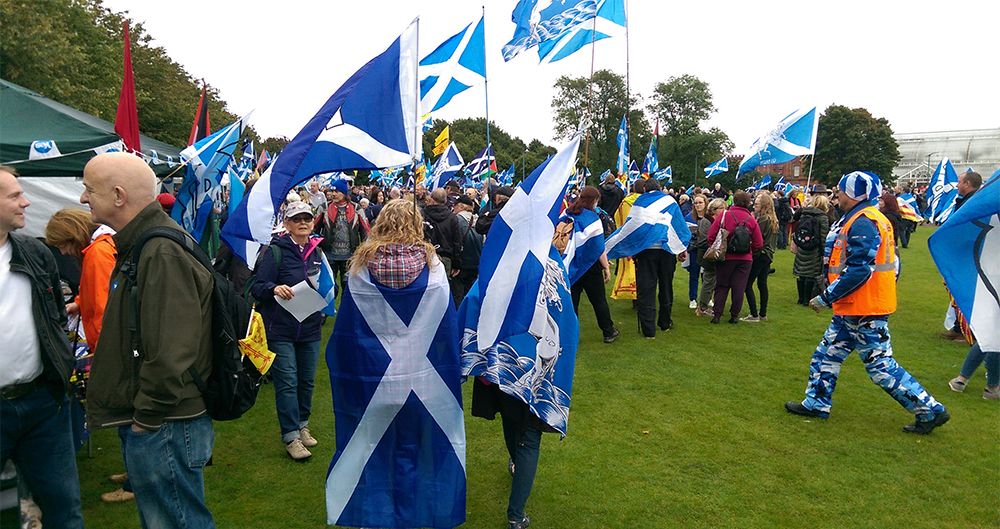
In last week’s Sunday Herald, Nicola Sturgeon wrote a piece to readers insisting that the issue of Independence transcends the economy, Brexit and balance sheets. Upon reading this article, I have never felt so sure that a quick fire referendum on the terms that the FM appears to want to fight it would lead to another – this time – critical defeat for the Yes side. The reason for this defeat I feel is threefold; there has been no serious critique of why we lost last time out, the Yes movement has become narrower and more entrenched within the ranks of the SNP, Europe and Brexit is not the issue to fight a second referendum.
Taking each in turn, Yes’ defeat in 2014 has never been seriously and ruthlessly examined within the movement. There is an emotional tie to the 2014 campaign for those of us who fought it to return to that time of what for us was a carnival of politics and positivity. As great as that campaign was to fight, ultimately we lost. Where I believe we lost and why the First Minister’s recent comments trouble me so much was on the economy. The currency plan and reluctance during the campaign to set out clear alternatives to that plan was a blow – however, when you consider the state of the British economy in 2014 it is staggering that we did not win the economic argument.
British Failure
One which is not overly reliant on oil reserves but that paves the way to a green revolution providing jobs that are secure, well paid and with full trade union rights. A society that provides opportunities for young people to reach their full potential regardless of economic background, whether that be onto further and higher education or to be trained in trading apprenticeships while earning a wage that can sustain their development in that process of learning. We need a period of prolonged introspection in the movement before we pull the second referendum trigger.
Diverse Yes
The second problem we now face is that one of the movement’s greatest strengths in 2014 was its diversity, cross party work and most importantly non-party grassroots activity. The majority of Yes activists in 2014 are now embedded within the SNP. While this has modest benefits in terms of organisational training and capacity it presents us with a problem far larger than we faced in 2014 – which was to translate the message that a vote for Independence does not equate to support for the SNP. A government of 10 years, the established party of government in Scotland for half of my lifetime, can’t and should not believe it can lead us to independence own its own.
We have all fought two elections since 2014 on party political grounds and some goodwill between Yes activists has been lost either temporarily or in some cases for good as the day to day issues of governance highlight clearly our differing approaches and ideas in managing the affairs of Scotland. SNP members must not forget or underestimate the impact of the Greens and Scottish Socialist Party, the other two parties of the Yes Scotland coalition in 2014. Likewise we cannot underestimate the impact of the organising skill of the SNP, and the considered perspectives within groups such as Radical Independence, Women for Independence and countless others. Diversity in party allegiance and visions of Independence are our movements’ greatest strength and we lose that at our peril.
Brexit: a blind alley?
[x_pullquote type=”right”]We have lots to discuss and lots to debate.[/x_pullquote]Finally, I feel Europe is the wrong issue to fight a referendum on. At a time of massive political change and upheaval it is incredibly dangerous to predict the public mood towards the prospect of another plebiscite at this time. Britain’s withdrawal from the European Union is a hugely complex and difficult procedure to come and it while the parties of Yes all backed a Remain vote in the referendum we did so for various reasons and we should not underestimate the number of Yes voters in 2014 who voted Leave – and crucially, their reasoning.In summary, we have lots to discuss and lots to debate before we can feel ready as a movement to fight and win another independence referendum. While I share the desire to be an independent nation as soon as is feasibly possible we need to accept that many don’t feel the same and many more are still willing to be convinced. The conscious deconstruction of the Yes movement over the last two years sets us back considerably and we cannot allow the campaign to be led from instructions from on high. The job of any subsequent independence campaign unit must be to act as an organisational hub helping to assist the campaign with a timeframe to victory however it cannot be at the expense of the diversity and grassroots nature of the movement which is what we ultimately lead us to Independence.

